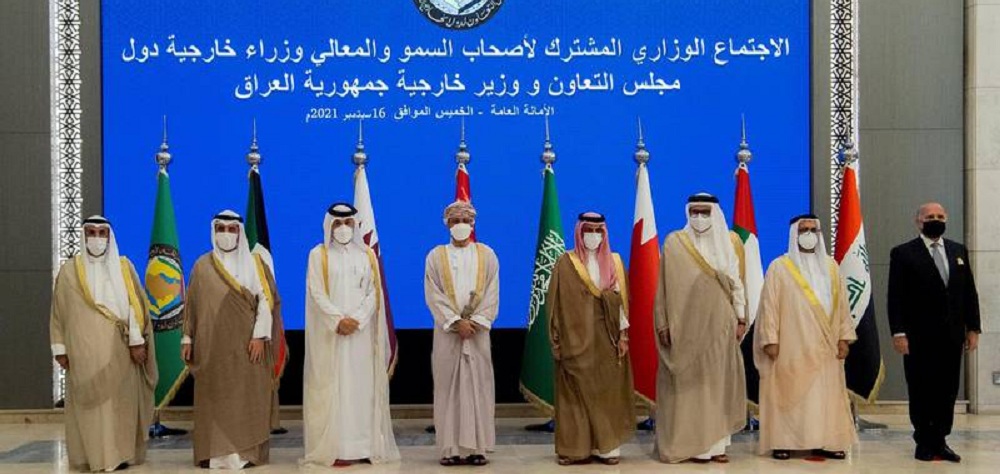AhlulBayt News Agency (ABNA): While Iran was recently approved as an official member of the Shanghai Cooperation Organization (SCO) and Tehran has applied multi-faceted diplomacy to upgrade the relations with various actors in the region and beyond it, the Iranophobia in the Arab world seems to remain in place as an American strategy. A glaring sign of this can be seen in the latest meeting of the (Persian) Gulf Cooperation Council, which raised unfounded accusations against Iran.
(P) GCC statement
In the closing statement of (P) GCC foreign ministerial meeting, which was held last Thursday in Riyadh, repeated and baseless accusations were made against Iran.
The statement once again highlighted what it called the "UAE sovereignty right" over the three Persian Gulf islands of Greater Tunbs, Smaller Tunbs, and Abu Musa, and claimed "any action taken by Iran on these three islands is void and has no effect on the UAE's sovereignty over the islands."
The statement addressed Iran nuclear talks, saying "any future talks should focus on Iran's tense behavior in the region, its support for terrorism and sectarian militias, missile program, international naval security and oil facilities. The GCC countries must be present in all these negotiations and other international and regional meetings, because this case is about regional security and stability." The statement in apparently interventionist remarks condemned Iran for "no adherence to commitments and increasing the level of uranium enrichment" and called on Tehran to commit to the International Atomic Energy Agency (IAEA) and cooperate with it.
Given the issues referred to in the statement, two questions look important: First, Why should the GCC countries, which have different positions on Iran and their relations with Tehran are not united at all, for example, Oman, Qatar, and Kuwait have good political and economic relations with Iran, all of a sudden reach a consensus in issuing an anti-Iranian statement? Second, why should the Arab bloc members put major focus of the statement on Iran instead of minding their own differences?
Anti-Iranian statement, a sign of inability to solve internal problems
At the present time, one can observe a very clear gap about relations with Tehran among the (P) GCC states. While Saudi Arabia and Bahrain, and to a lesser extent the UAE, are hostile to Iran, on the other hand, others established friendly ties to the Islamic Republic. For example, diplomatic relations between Iran and Oman continue at the highest possible level, and in addition to close political relations, Muscat has played an important role in initiating nuclear talks between Tehran and the West in recent years and is now mediating the Yemeni crisis. Iran's political ties also with Qatar and Kuwait are at appropriate level and Doha has repeatedly asked for mediation to patch up Iranian-Saudi relations.
Anti-Iranian consensus in such inconsistent atmosphere expresses one thing: The US is pressing the Persian Gulf Arab states to rebuild their united front at the (P) GCC as it weakened to a large extent over the past years.
As an answer to the second question, it can be asserted that repeating the unfounded past accusations reveals the bloc's inability to discuss internal divisions and bridge them. The reality is that massive differences have practically rendered the (P) GCC unviable.
The ideological differences and regional political orientation among the members of the Cooperation Council under pro and anti-Muslim Brotherhood camps in recent years have been the main divisive issues in the Arab world. The UAE and Saudi Arabia have made opposition to the Muslim Brotherhood in West Asia and North Africa their main foreign policy strategy and spared no action against the opposite camp, led by Turkey and Qatar.
On the other hand, there are wide-ranging border and political differences among the (P) GCC member states. In addition, the arms rivalry of members and the lack of consensus among them on various crises at the regional and trans-regional levels has seriously called into question the effectiveness of the bloc. With these internal gaps, the anti-Iranian statement is expressive of foreign pressures on the Arab leaders to set aside internal cleavages when it comes to controversial relations with Iran.
Deep discordance among the member states has transformed the (P) GCC into an organization fallen so hard into a coma that even the US artificial ventilation cannot save it from structural collapse, unless it stops being Washington instrument and makes moves to settle internal differences and change its key policies for the good of regional peace and cooperation.
/129

